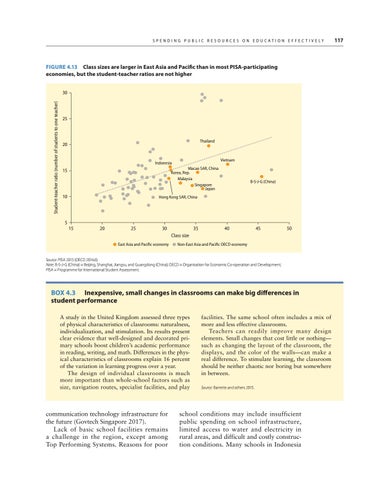S P E N D I N G P U B L I C R E S O U R C E S O N E D U C AT I O N E F F E C T I V E LY
FIGURE 4.13 Class sizes are larger in East Asia and Pacific than in most PISA-participating economies, but the student-teacher ratios are not higher
Student-teacher ratio (number of students to one teacher)
30
25
Thailand
20
Vietnam
Indonesia Macao SAR, China Korea, Rep. Malaysia Singapore Japan
15
10
B-S-J-G (China)
Hong Kong SAR, China
5 15
20
25
30
35
40
45
50
Class size East Asia and Pacific economy
Non-East Asia and Pacific OECD economy
Source: PISA 2015 (OECD 2016d). Note: B-S-J-G (China) = Beijing, Shanghai, Jiangsu, and Guangdong (China); OECD = Organisation for Economic Co-operation and Development; PISA = Programme for International Student Assessment.
BOX 4.3 Inexpensive, small changes in classrooms can make big differences in student performance A study in the United Kingdom assessed three types of physical characteristics of classrooms: naturalness, individualization, and stimulation. Its results present clear evidence that well-designed and decorated primary schools boost children’s academic performance in reading, writing, and math. Differences in the physical characteristics of classrooms explain 16 percent of the variation in learning progress over a year. The design of individual classrooms is much more important than whole-school factors such as size, navigation routes, specialist facilities, and play
communication technology infrastructure for the future (Govtech Singapore 2017). Lack of basic school facilities remains a challenge in the region, except among Top Performing Systems. Reasons for poor
facilities. The same school often includes a mix of more and less effective classrooms. Teachers can readily improve many design elements. Small changes that cost little or nothing— such as changing the layout of the classroom, the displays, and the color of the walls—can make a real difference. To stimulate learning, the classroom should be neither chaotic nor boring but somewhere in between. Source: Barrette and others 2015.
school conditions may include insufficient public spending on school infrastructure, limited access to water and electricity in rural areas, and difficult and costly construction conditions. Many schools in Indonesia
117
